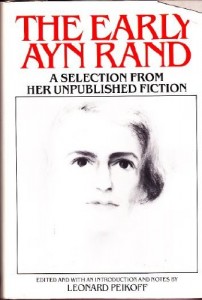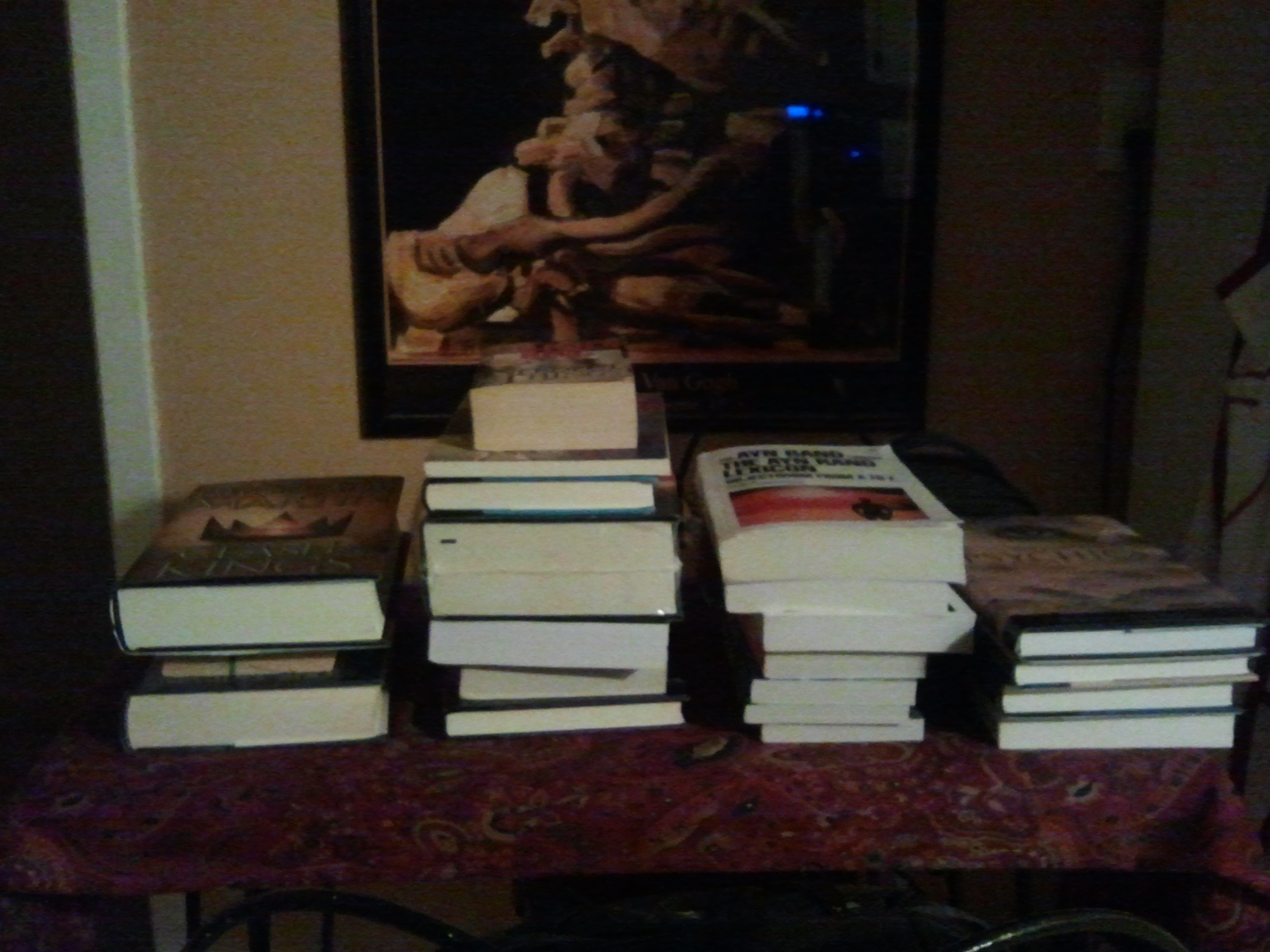I’ve pretty much read everything Ayn Rand has written with the exception of all the things published in The Objectivist newsletter. But all her published fiction and non-fiction books I’ve torn through. I’ve even gone through a fair bit of the works by authors that were associated with her, i.e. Nathaniel Brandon. I have a pretty good grasp on the philosophy and I’ve been trying to adhere to it in my life. Once you’ve got a good grasp on Objectivism and the principals involved you can pretty much demolish any argument against you – your views are based on a concrete foundation. But “The Early Ayn Rand” isn’t so much about the philosophy of Objectivism as it is more of a look at where Ayn Rand came from and grew as a writer.
It’s important to know that Ayn Rand came to America in her early 20’s without a firm grasp of the language. She just knew that she had to get out of communist Russia at all costs. Once she got here she not only had to find employment but she had to quickly learn how to flourish in a new language. If you go back and read some of her very earliest works you can see what I’m talking about. Even though she’s able to get her concepts and ideas across it’s still a very basic use of the language. That’s not to say that her writing wasn’t elegant, it was. “Anthem” was the first thing that I’d ever read and it changed my life. I remember getting home from the book store and reading the whole thing in one sitting. I couldn’t stop reading it. It was just an enchanting read that I couldn’t put down. That’s the power that her literature has on most people.
Well, one of the things I look for when I’m trying to find a new book to read is whether or not the author has their own style, how they use the language, and the mechanics they employ. I really enjoy the complex literary style of authors like Comte de Lautréamont and David Foster Wallace. These are two very different writers but they definitely have their own style and use technicality in their work.
Well, the technicality in Rand’s literature is in how to get across complex philosophical concepts in a way that’s easy to understand. Have you ever been in an argument with someone, gone on and on trying to explain something, and then someone come along and sums up your argument in one sentence? Well, Ayn Rand has that ability to her arguments. There’s just one problem: you have to actually read her stuff.
So many people I’ve argued with over Ayn Rand have never read her material. They only go with what they’ve read about online or what they’ve heard from people on MSNBC. So not only do I have to argue my point but I also have to re-educate the person. These are the people, for example, that think “altruism” and “benevolence” are the same word. These are the people that think “crony capitalism” and “capitalism” are the same thing. And these are the people that think “selfishness” and “piggishness” are the same thing.
These are the people that think the ends justify the means.
Just briefly I’ll quote what Objectivism is:
“Objectivism’s central tenets are that reality exists independent of consciousness, that human beings have direct contact with reality through sense perception, that one can attain objective knowledge from perception through the process of concept formation and inductive logic, that the proper moral purpose of one’s life is the pursuit of one’s own happiness (rational self-interest), that the only social system consistent with this morality is one that displays full respect for individual rights embodied in laissez-faire capitalism, and that the role of art in human life is to transform humans’ metaphysical ideas by selective reproduction of reality into a physical form—a work of art—that one can comprehend and to which one can respond emotionally.”
So when people see “rational self interest” they think that means selfishness. And they think selfishness is doing what ever you want. Wrong. Rational self interest doesn’t advocate doing whatever you want at all costs. Your rights as an individual and you doing what you want to do shouldn’t interfere with another’s life and rights. Selfishness is wanting everything that is owed to you and wanting more. We all want everything that is owed to us in our check from work. Yet, we still would like a raise.
Piggishness is splitting the cost of a 10 dollar pizza with your friend but you end up eating 75 percent of the pizza without asking if that’s okay. But Selfishness isn’t devoid of value. Your wife and your child should be your highest value. You should want to do whatever you can to support your highest value. People are wrong when they say that it is a “self-less” act to “sacrifice” for your children. Actually, it is a completely selfish act because the continuation of your highest values is in your own rational self interest. A “sacrifice” is when you give up a higher value for a lower value. So when you give up drinking while your pregnant isn’t a sacrifice because you should value your child over your drinking. Yes, I have to argue semantics with people all the time.
Semantics is one of the many things that turn people off when it comes to Ayn Rand. If they would only take the time to look up how she defines concepts like Selfishness, Greed, and Altruism they’d be in a better place.
“Why is she against altruism? You should want to help other people.”
She does want to help other people, but that’s not what altruism means.
I don’t want to cover Objectivism too much here. But I do want to get some things out of the way. So now that I’ve touched on Objectivism and all that jazz I can move on.
The interesting part of The Early Ayn Rand is that you can see the growth of a writer.
The book starts out with some unpublished short stories and moves on to the play, Red Pawn. The book also contains some excerpts from published work and you can witness her writing and editing process. As the book goes on you see how the writer develops from simple sentence structure to more complex usage of the language.
And when I say “simple sentence structure” I’m not saying that as a bad thing. If you read anything by Cormac McCarthy you’ll see that he uses a very simple, very basic, writing style. He won’t even punctuate certain words. This doesn’t take away from the book or the story at all. McCarthy just doesn’t think you need all that stuff to get your story across.
Well, the early Ayn Rand material is the same way. From the very first thing you read of hers you’ll see the philosophy of Objectivism is in there. It’s still concrete. You’ll see that she hasn’t changed her mind or morphed her ideology from her early 20’s till her death. She always believed in Man as a heroic figure. She always believed in the power of the individual, the power of ideals, and the power of ambition.
So even though you don’t see her philosophy change through her writings you’ll see how it is phrased and how in comes across clearer as time goes on.
The people that say she’s not a good writer I should point to even her earliest work. Here’s a quote from Anthem written in 1937:
“What is my joy if all hands, even the unclean, can reach into it? What is my wisdom, if even the fools can dictate to me? What is my freedom, if all creatures, even the botched and impotent, are my masters? What is my life, if I am but to bow, to agree and to obey?”
And then we’ll end with a quote from Atlas Shrugged, published 20 years later:
“Productiveness is your acceptance of morality, your recognition of the fact that you choose to live–that productive work is the process by which man’s consciousness controls his existence, a constant process of acquiring knowledge and shaping matter to fit one’s purpose, of translating an idea into physical form, of remaking the earth in the image of one’s values–that all work is creative work if done by a thinking mind, and no work is creative if done by a blank who repeats in uncritical stupor a routine he has learned from others–that your work is yours to choose, and the choice is as wide as your mind, that nothing more is possible to you and nothing less is human–that to cheat your way into a job bigger than your mind can handle is to become a fear-corroded ape on borrowed motions and borrowed time, and to settle down into a job that requires less than your mind’s full capacity is to cut your motor and sentence yourself to another kind of motion: decay–that your work is the process of achieving your values, and to lose your ambition for values is to lose your ambition to live–that your body is a machine, but your mind is its driver, and you must drive as far as your mind will take you, with achievement as the goal of your road–that the man who has no purpose is a machine that coasts downhill at the mercy of any boulder to crash in the first chance ditch, that the man who stifles his mind is a stalled machine slowly going to rust, that the man who lets a leader prescribe his course is a wreck being towed to the scrap heap, and the man who makes another man his goal is a hitchhiker no driver should ever pick up–that your work is the purpose of your life, and you must speed past any killer who assumes the right to stop you, that any value you might find outside your work, any other loyalty or love, can be only travelers you choose to share your journey and must be travelers going on their own power in the same direction.”
You’ll see that she’s still saying the same things; she still believes and stands for the same ideals. However, her writing has developed considerably.
I make this point because it’s interesting to watch the growth of a writer that came to a country with a very limited grasp of the language but worked at it until it was mastered. Do you know the fear that someone has to have to say to themselves, “I’m going to this country. I can’t speak the language but I will eventually. And when I learn the language I’ll master it and finally tell the world the philosophy that I know is correct.”



